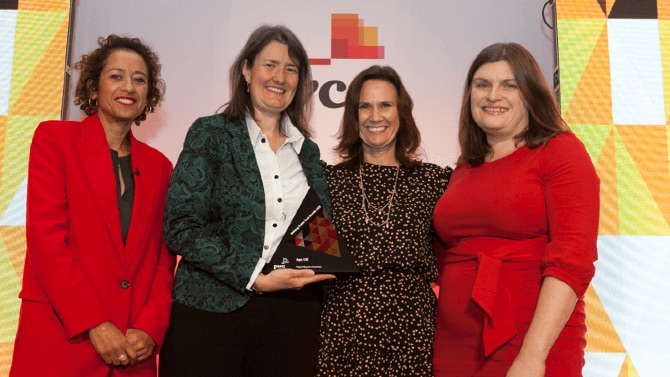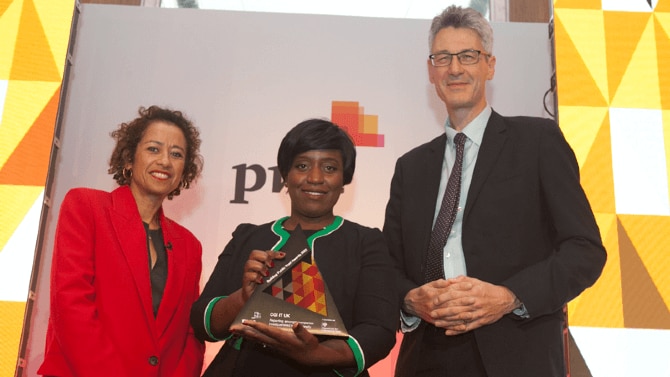Building Public Trust 2022 Award winners
Now in their 20th year, our mission for these awards is simple - it's to inspire business to build trust with the public and work together to solve important problems. Our awards celebrate organisations which are leading the way in delivering sustainable outcomes through insightful reporting. The Building Public Trust Awards cover all parts of the economy and the issues that matter to society.
Below are the winners and highly commended organisations of our 2022 Building Public Trust Awards.
Read comments from the independent judging panel below to see how these organisations differentiated themselves.
This is a modal window.
Kevin Ellis opens last year's Building Public Trust dinner
Award categories
Select a category to see the award winners and judges' comments:
Sector awards
Reporting in Charities
Winner: Age UK
Highly commended:
- Oxfam
- The National Society for the Prevention of Cruelty to Children
When we presented this award last year, we noted that trust and confidence in the UK’s charities sector had rebounded since 2019. This recovery has continued, supported by an ongoing rise in the quality and transparency of charities’ reporting, as they continue to build trust with their diverse stakeholders. The judges felt the reporting from all three nominees fully embodied the improvement in reporting underway across the sector, especially in their openness and honesty about areas where needed to do better. Age UK won the award for the second successive year, with continued evolution in their reporting. It was set apart by its strong narrative based around its key objectives and its engaging Q&As with staff at various levels. A judge commented:
“Age UK makes it easy to see what has been spent and what outcomes achieved, which is vital in any charity’s reporting.”

Shown here (left to right): Samira Ahmed, Vicki Thornton, Helen Turnock, Helen Earner
Reporting amongst companies headquartered internationally (in association with the Department for International Trade)
Winner: CGI IT UK
Highly commended:
- Siemens UK
- VolkerWessels UK
Companies headquartered internationally that invest and operate in the UK are a major source of employment and economic activity for this country. It’s important that their reporting distinguishes clearly between UK-specific and international aspects, to provide a transparent and holistic view of their impacts across the economic, social, environmental and tax domains. The judges praised the quality and accessibility of the reporting from all the shortlisted companies, especially their detailed disclosures on their environmental impacts and strategy. However they felt that CGI gained an edge through elements such as its strong quantitative reporting on training and volunteering, including social outcomes, and detailed disclosures on workforce diversity & inclusion. One member of the judging panel commented:
“CGI has produced a great annual report – going above and beyond what we see from many UK-listed companies.”

Shown here (left to right): Samira Ahmed, Mattie Yeta, David Riches
Reporting in the FTSE 350
Winner: ITV
Highly commended
- Barratt Developments
- United Utilities Group
Amid today’s rapid and unpredictable change, the demands on companies’ reporting – and the scrutiny their disclosures are under – is increasing rapidly. Companies across the FTSE 350 have responded positively in areas like climate change reporting. But too often these improved disclosures are siloed from the strategic narrative, and the pressure to comply with increased regulation means wider innovation in reporting has largely stalled. Against this mixed background, the judges felt the nominees for the overall FTSE 350 award showed that some organisations are successfully continuing to push back the boundaries, with clear and coherent reporting that provides clear linkage from purpose to strategy to operations. Nominated for the first time for this award, ITV was set apart in particular by its impressively accessible and well-articulated disclosures on its social purpose and impacts. In this regard, a judge commented:
“ITV’s reporting provides a strong line of sight from the board all the way through the organisation.”

Shown here (left to right): Samira Ahmed, Malini Mudaly, Georgina Ball, Iain Wright
Reporting in Private Business
Winner: Wates Group
Highly commended:
- Co-operative Group
- Infinis Energy Group Holdings
For many private businesses, reporting took something of a back seat during the pandemic because of more pressing priorities. This year, many have once again been focusing on communicating their impacts and performance to their various stakeholders. That’s especially evident among larger private businesses, which will soon become public interest entities (PIEs) status under the audit reform agenda. The judges felt the nominees had all produced annual reports that bore comparison with listed PLCs, combining highly professional presentation with a strong sense of authenticity, enabling the distinctive “personality” of each business to come across. First-time nominee Wates Group won for aspects including its strong linkage between strategy and performance, detailed environmental and risk reporting, and engaging use of case studies. A panellist said:
“Wates’ climate change reporting is a very strong effort – much stronger than some listed company reports I’ve seen.”

Shown here (left to right): Samira Ahmed, Sir James Wates CBE, Iain Wright
Reporting in the Public Sector (in association with the National Audit
Office)
Joint winners:
British Broadcasting Corporation
The Crown Estate
Highly commended:
- National Highways
Open and transparent reporting by public bodies is vital to ensure accountability for using taxpayers’ money effectively and providing high-quality services to citizens. The judges felt that this year’s nominees reflected the ongoing gradual improvement underway in public sector reporting, especially in areas like strategy, risks, the external environment within which bodies work, and sustainability. But they also highlighted that more needs to be done to improve the timeliness of the publication of annual reports from across the wider public sector. They also encouraged bodies to think about the sheer length of annual reports as this may act as a barrier to their accessibility for citizens, an issue that innovation – including more use of digital links – might help to address. The panellists were especially impressed by the BBC’s clear remuneration reporting and honesty over sensitive issues and explanations of complex concepts within their financial statements, and by The Crown Estate's strong use of graphics and case studies. In the vote, the two came neck-and-neck. A judge commented:
“The transparency of the BBC’s remuneration reporting is the best we’ve seen in any category of these awards…[And] The Crown Estate’s reporting is first class, and getting better.”

Shown here (left to right): Samira Ahmed, Leigh Tavaziva, Gareth Davies

Shown here (left to right): Samira Ahmed, Andrew Hudson, Sophie Morton, Gareth Davies
ESG in the FTSE 350 and Public Interest Entities
Winner: GlaxoSmithKline
Highly commended
- Taylor Wimpey
- Unilever
As reporting on environmental, social and governance (ESG) issues continues to rise up the agenda across business and society, it’s also an area that’s seeing arguably more regulatory change than any other. With reporting under the TCFD standards now mandatory for FTSE 350 companies, we’re seeing new Sustainability Disclosure Requirements proposed by the UK Government, and parallel initiatives around ESG reporting coming down the track from standard setters at a global level as well as in Europe and the US. Against this fast-evolving background, the judges noted that all the nominees had done a good job of balancing detailed disclosures with the need to tell a clear and engaging story. Nominated for the first time for this award, GlaxoSmithKline took first place with reporting that the judges felt brought its core purpose to life – ‘To get ahead of disease together’. A panellist commented:
“GSK blends detailed, deep-dive ESG data with compelling narratives, providing a good overall view of its ESG goals and performance in one place.”
This is a modal window.
ESG in the FTSE 350 and Public Interest Entities
Related content
Climate Change Reporting in the FTSE 350
Winner: Aviva
Highly commended
- Standard Chartered
Climate change reporting under the standards set out by the Task Force on Climate-Related Financial Disclosures (TCFD) is now required for all FTSE 350 companies. Many produced their first reports this year, with the leaders going beyond the bare minimum to tell a clear story about how they use climate change metrics to help drive strategy. The judges noted that the overall quality of climate change reporting is rising year-on-year, and felt that both nominees’ accessible and integrated disclosures put them in the forefront of this trend. Last year’s winner Aviva won the award once again, with climate reporting that the judges described as both accessible and believable, showing credibly how climate risk is embedded in every area of the business. One panellist commented:
“This is excellent climate reporting. Aviva sets the benchmark that other contenders need to get to.”

Shown here (left to right): Samira Ahmed, Andrew Dinwiddie, David Riches
Related content
Corporate Governance in the FTSE 350
Winner: SSE
Highly commended
- ITV
- Pearson
The best governance reporting goes beyond descriptions of processes and procedures, to tell an engaging story about how governance has been applied and the business outcomes achieved as a result. The need for this linkage to outcomes shines through in the 2018 UK Corporate Governance Code, and also in the FRC’s more recent Review of Corporate Governance Reporting 2021. Meanwhile, the introduction of mandatory climate change disclosures under the TCFD standards has increased the volume of governance reporting this year. Against this evolving background, the leaders in governance reporting have retained their edge, with the three shortlisted companies and the winner being the same as last year. The judges said all three had once again produced excellent governance reports, but felt SSE was set apart by its strong disclosures on stakeholder engagement and its net zero strategy. A panellist commented:
“SSE’s reporting on employee engagement really stands out – the coverage of staff feedback is excellent.”
This is a modal window.
Corporate Governance Reporting in the FTSE 350
Cyber Security Reporting in the FTSE 350
Winner: Vodafone Group
Highly commended:
- Prudential
- TBC Bank Group
Cyber security in annual reports still remains relatively uncommon despite its criticality for investors and the public. By accelerating organisations’ shift to digital, COVID-19 expanded the potential attack surface for cybercriminals. In the year since the pandemic receded, cyber threats have continued to increase, including through rising incidences of ransomware and attacks by nation state-backed actors. As a result, this new and still-evolving area of reporting is increasingly vital for companies to demonstrate a firm grasp of their risks. The judges noted that all three nominees had succeeded in striking a good balance between providing detailed information and making it easily accessible to the non-specialist reader. And they felt that Vodafone – last year’s winner – had the edge once again, through features including embedding QR codes in its report to click through to videos with more information. A panellist commented:
“Vodafone talks about cyber being every employee’s responsibility. It really feels like a DNA topic for the company.”
This is a modal window.
Cyber Security Reporting in the FTSE 350
Remuneration in the FTSE 350
Winner: Tesco
Highly commended
- InterContinental Hotels Group
- Severn Trent
Remuneration reporting has always been one of the most heavily-scrutinised aspects of corporate reporting. But the focus on companies’ disclosures on executive remuneration has intensified still further in the past year, with the FRC’s review revealing widespread shortcomings in how companies are evidencing the strategic alignment of performance measures and engagement with employees. The judges were looking to companies to explain and justify the remuneration of executive directors in the context of corporate performance, long-term company strategy – including ESG priorities – and the pay arrangements for the wider workforce. While they noted that all the nominees had produced impressively clear and open reporting, they felt Tesco was set apart by its strong strategic linkage and consistent focus on fairness. A judge commented:
“This is a business that takes really seriously the value of everyone from the CEO to the person on the shop floor. That really shines through in the reporting.”
This is a modal window.
Remuneration Reporting in the FTSE 350
Social Reporting
Winner: Barclays
Highly commended:
- Unilever
- Vodafone Group
The launch of the new award for ‘Social’ reporting reflects the increasing importance and scrutiny of companies’ disclosures on their interactions with a wider network of people that goes beyond workforce to include supply chains and communities.
To date, the focus on ESG has primarily surrounded the ‘E’ (environmental) aspect, partly driven by regulation, and an increasing global focus on environmental factors. As the focus on S (social) aspects rises up the boardroom agenda, so does the need for transparent and robust reporting. The judges noted that all three nominees had detailed and engaging social reporting, each with different strengths across a broad range of criteria, reports and stakeholders. But they felt Barclays’ social reporting was set apart by its authentic tone, and compelling coverage of community programmes such as its LifeSkills and COVID-19 Community Aid initiatives. A judge commented:
“Barclays’ reporting is very thoughtful in the way it weaves in aspects of social value and people into the overall story – making it feel like a conversation that really happens around the Board table.”

Shown here: Samira Ahmed, Chris Manners, Claire Dove CBE DL
Tax in the FTSE 350
Multinationals
Winner: BP
Highly commended
- Barclays
- Prudential
Winner: SSE
Highly commended
- Legal & General Group
- Lloyds Banking Group
As in previous years, the environment for tax reporting is continuing to see rapid and sweeping change. A major development this year has been the increased focus on tax within ESG – a shift that we’ve reflected by expanding our awards criteria. However, that’s just one of the significant changes underway around tax transparency and trust, with others on the near-horizon including the EU’s public country-by-country reporting and the OECD’s ‘Pillar Two’ minimum corporation tax rate. The judges were impressed with how the nominees for both tax awards succeeded in telling a clear and engaging story about their tax approach, numbers and contribution, supported by easily-digestible graphics. BP retained the multinational award, and was praised for its
“convincing approach of starting with values and principles, and then showing how it puts these into action.”
UK-focused winner SSE was set apart by elements including a Q&A with its head of tax, with one judge commenting:
“SSE’s articulation of why tax matters is so clear that it excites the human spirit.”
Tax in the FTSE 350 - Multinationals
This is a modal window.
Tax in the FTSE 350 - UK Focused Companies
Contact us










Impact in Social Enterprise (in association with the School for Social Entrepreneurs)
Joint winners:
Nemi Teas
Your Own Place
Highly commended:
Social enterprises – businesses that operate with primarily social or environmental objectives, reinvesting profits to support their mission – are one of the most dynamic, inclusive and diverse parts of the UK business landscape, collectively employing some 2 million people. It’s also a sector that PwC actively supports, including through our longstanding collaboration with the School for Social Entrepreneurs. The judges noted that the reports from the nominees encapsulated the “unstoppable” momentum behind the social enterprise movement, with one characterising all three reports as “fantastic.” In a very close vote, Nemi Teas and Your Own Place emerged in joint first place – but the panel felt the real winner was the social enterprise community as whole. One judge commented:
Back to awards categories
Shown here (left to right): Samira Ahmed, Pranav Chopra, Claire Dove CBE DL
Shown here (left to right): Samira Ahmed, Rebecca White, Claire Dove CBE DL